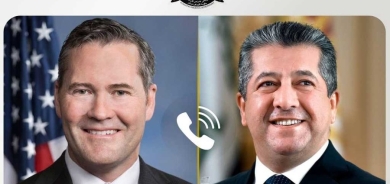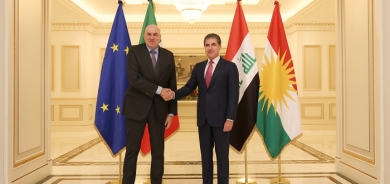Hayat Alvi to Gulan Magazine:In terms of Islamic ideologies in Egypt, the similarities and perspectives are similar to Wahhabis / Salafists in Saudi Arabia
January 7, 2012
Exclusive Interviews

Hayat Alvi is Associate Professor of Political Science at the US Naval War College, and is a specialist on the Middle East. Regarding to the shifts in the situations in Syria and redirecting towards the Arab-Israeli issue, along with the impacts of the current situations in Syria upon the region as a whole, we have contacted the Professor Alvi and she replied to our questions in an exclusive interview to Gulan Magazine as the following:“* The views Professor Alvi expressed are her own”
* Almost a year has passed since the “Arab Spring” started, but observers believe that the directions of the situations are not optimistic about the future, especially after the elections in Egypt and Tunisia. The question is, in your view; how do you read the outcomes of “The Arab Spring” after its first year?
- This is just the beginning for pro-democracy movements in the region, the whole process of removing old dictators and regimes and entire political systems will take a very long time. Removing dictators from power and changing the entire political system of a regime will take a very long time. We cannot judge so quickly, as one year is a short time when it comes to social revolutions. The process is a long one.
* Whenever people talk about the success of the Islamic political parties, in particular “The Muslim Brotherhoods”, the question that rises is whether Islam and democracy are compatible with each others or not, but the main issue here isn’t related to Islam or democracy, yet it is related to those Islamic political parties that intersect the way before civil constitution and secularism laws. In your view; how far do you think that the lack of a civil constitution and the return to divine laws are considering as obstacles for building democracy?
- And, each country in the region is different in terms of their respective political systems and institutions. That must also be considered in evaluating the effectiveness of the "Arab Spring" pro-democracy movements. Part of that measurement also includes demographics of respective countries. Egypt has the largest population, huge military, and many power brokers in the political elite. These factors have an impact on the effectiveness of pro-democracy movements.
If the post-revolution political systems do not have sincere commitments to secular democracy, the nature of non-secular (religious-based) "democracies" will be far more challenging. The temptation for religious leaders to exert their own brand of "moderate Islamic politics" - however that is defined - will be very strong, but very difficult to balance.
Political Islamic parties see an opportunity to take advantage of power vacuums in the region. Islam and democracy are compatible, as we see with Muslims in India and Turkey, but maintaining a balance in terms of how women and minorities are treated in an "Islamic state" will be most challenging.
* Many observers believe that the religious political parties, in particular the Islamic parties, use the religion as a mean to get to power, and after the gain power they use the religion once again to stay in power. In such cases, the religion becomes as a cover for the injustice, unfairness, and violation of the basic human rights to continue in the developing countries like the Arab societies as a whole. How far do you think that it is important for religion to stay as a personal faith for the individuals and be kept away from politics?
- How does an Islamic party and leadership draw the line between a "moderate" Islamic democracy and a hardline theocracy (like Saudi Arabia or Iran) will make all the difference.
* But the Muslim Brotherhoods and the Salafis are already extremists; they are not like the Turkish AK Party. Many observers believed that the Islamic political parties in the Arab countries, in particular in Egypt, will be able to rule in the framework of a secular constitution similar to the “Justice and Development Party – AKP” in Turkey, but obviously; the Egyptian Islamic political parties are not the Turkish “Justice and Development Party”. In your view; what are the differences between them?
- It depends on how you define the word "Extremist," because the Muslim Brotherhood itself is internally divided (there's no consensus) about their ideologies and what they wish to embrace in terms of political Islamic ideology. The Salafists are far more orthodox, so I tend to agree that they lean more towards what we would see as "extremist," in terms of their ultra-orthodoxy. But the Ikhwan (Muslim Brotherhood) do not have consensus, and they are also divided generationally: the older members have more orthodox views than the younger members.
Turkey and Egypt are two entirely different countries. Turkey's founder, Mustafa Kemal Ataturk, dictated a national ideology for a majority Muslim population, based on secularism and democracy. Egypt has never seen such leadership or ideology. Egypt's Islamist parties can try to embrace certain aspects of the Turkish AKP model, but certainly they are not completely suited for each other.
* It was decided to form a committee in Egypt to draft a constitution, and it is expected that the majority members of this committee will be from the Muslim Brotherhood groups, therefore; there are fears that the drafted constitution might be similar to the constitution of the Islamic Republic of Iran. In your view; if Egypt turned into an Islamic State, similar to Iran, then how far do you think that Egypt will change the appearance of the Middle East?
- I think a more appropriate analogy is Saudi Arabia, not Iran. I think people mention Iran because of the Islamic revolution there, but in terms of Islamic ideologies in Egypt, the similarities and perspectives are similar to Wahhabis / Salafists in Saudi Arabia, and some members of the Muslim Brotherhood and definitely the Salafists in Egypt. In reality, it has been the secular liberal pro-democracy activists in Egypt who have spearheaded the revolution there, but the Islamists seem to be "hijacking" the revolution, given the power vacuum and the manipulations of the SCAF (Egyptian Military). In Iran, similar events took place, as Ayatollah Khomeini took advantage of the social unrest and anti-Shah sentiments, but we cannot say that the Iran case is identical to Egypt's case in 2011. They are apples and oranges, especially in terms of their different histories, ideologies, leaderships, and the nature of their respective revolutions and who was involved.
Ideologically, Egyptian Islamists have more in common with Saudi Arabia's Wahhabis / Salafis, than with Iran's Twelver Shi'ites.
* If we look at the situations in Syria, the Assad Regime desires Israel to have tough position against Syria, that way the Assad Regime can take advantages from religion and to also to gain support from the Islamic World claiming that he is fighting the Jews and Israel. How far do you think that Assad can take advantages in this respect?
- Not much. Syria is not a military match to Israel, and of course history has shown that Syria has lost badly at the hands of the Israelis. Assad cannot afford a war against Israel, or even a small-scale conflict, because Syria's economy is destroyed, including by sanctions, he cannot afford further escalation against Israel.
However, that said, a desperate dictator cornered and fearful of his own fate and the fate of his people (the Alawites) might do something terribly irrational. That's always a possibility.
But, he must realize that just because Israel and Syria might heighten friction between each other, doesn't exactly translate into the Arab/Islamic world coming to Syria's rescue. No country in the region is in the mood to wage war, even against Israel. No country in the region can afford a war given the bad state of most economies. So, if Assad is thinking about such a strategy, he is really fooling himself.
* Nowadays, the security council in particular the United States, France, and UK can't make any decision about Syria because the positions made by Russia and China, therefore; all the world expecting the Arab League to do something. How do you read this equation?
- Arab League can do and say all it wants to, but how do their words translate into policy and action is what really matters.
I don't think the AL has the teeth to take on Assad and Syria, without the help of Western powers, and that can't happen without UN support.
* But the International Community is sort of paralyzed, they can't take any kinds of actions against Assad, they even can't support the Syrian opposition, then how is it possible to gain international support to the Syrian people?
- The reality is that Syria is not Libya. The international community recognizes that, and sees the risks in engaging militarily against Syria. This action will also harbor risks of conflicts spilling over in the region, of course sucking Lebanon into it, possibly parts of Iraq and Turkey as well, and then either directly or indirectly Israel too. That's a huge risk.
Libya was an easier case, because it's much smaller, the Libyan military is much smaller in size than the Syrian military, and the task of removing Qaddafi and his regime from power -- even though it took several months -- was easier than any action that would take place in Syria.
We must also remember that Syria's Assad regime has the friendship and support of Iran and Russia.
* Last Question: If the Assad Regime topples down, observers expect that the Islamists will succeed is to power, and this will have great influence upon Lebanon and the region as a whole. The question is, in your view; how far do you think that Assad Regime, through staying in power or through its downfall, will change the political equation of the region?
- It depends on who/what remains in power after his downfall. His Ba'th Party circle of advisers might decide that he is expendable, and in that case, only Bashar al-Assad himself would fall, but the regime itself would remain in place. That's not what the protesters want, as they wish to see the entire regime removed. But, if that scenario occurs, then I think there's a high potential for civil war between the Ba'thists against the Islamists, which of course would be devastating.
If the entire Assad regime and Ba'th Party fall and are removed completely, and replaced by an Islamist party and leadership, again it will depend on the nature and ideology of such a political system and the policies that they would implement domestically and regionally, especially affecting Lebanon. It all depends on the ideologies that they embrace... if they are diehard Salafists, then they might go head-to-head against Hezbollah in Lebanon. If they are "moderates," they might be less inclined to create tensions domestically or regionally. We have to wait and see what happens. But, Assad's removal, and especially the Ba'th regime's removal will take a long time, and might even entail civil war. It's hard to make predictions about these scenarios right now.















